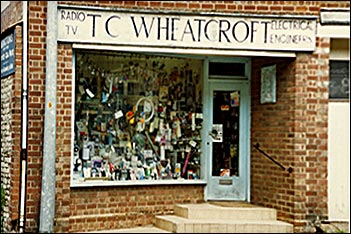|
I am Veronica Rose Wheatcroft-McGain. Wheatcroft being my maiden name, McGain being my husband’s name. I don’t believe in giving up my name so we put them together. This is T. C Wheatcroft’s electrical shop that I now run on my own. Originally started in 1945/46 my father, whose business this was, Theodore Clive Wheatcroft was brought up in Sandbanks. Didn’t wear shoes until he was 9, because there was nothing but sand there in those days. Tried to row across the Channel when he was 9, on his own in his little boat, but got stuck on the mud flat, I think he got into quite a bit of trouble that day.
His mother died when he was 13 and his father was quite elderly so he had to leave school to support his father and himself and had three jobs. Getting up about five, he first collected sticks to take round to the hotels, then, I think, he did a grocery round and in the evening he worked as a telephonist. My mother came from Wellingborough; T. H. Higgins (the stonemasons family business), was her grandfather on mother’s side. Before the war, in that era following the slump, things were still difficult in Northamptonshire, and she went down to Bournemouth and worked as a private secretary in a large company of estate agents.
In the evenings she used to teach ballroom dancing, having done ballet since she was very young age, with the Kilburn School of Dancing. One day a gentleman, who she was teaching, said. ‘How am I doing Miss Matthews?’ and she said. ‘You’re walking very well, Mr.Wheatcroft.’ That’s how they met and one day they were on the bus in Bournemouth and they’d both got little attaché cases. I think they were so wound up with each other that when they got off the bus my dad went to where he was going to and opened the case and out flopped this load of knitting, they’d got the wrong cases. Anyway before the war I think, or when war broke out, they came back up to Wellingborough, where my grandmother lived, and then eventually went back down to Bournemouth and got married in 1941. I'm not sure when they returned to Northamptonshire, and Rushden, but quite sometime before I arrived in January 1944. Much later, my sister, Chérie was born in September 1954.
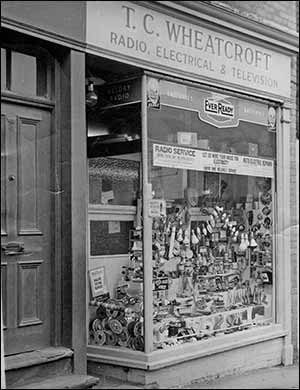 |
|
Wheatcroft's first shop
|
|
Dad opened a business up here as soon as he could after the war. I think he just did a few repairs and bits and pieces to start with and then he got these premises at 3 Church Street, next to Cook’s the printers. He used to work until two, three, four in the morning. We had a little pebbledash cottage along Bedford Road and I can remember always staying awake at night until I could hear my dad coming because I knew my mum was a little bit scared. In those days, along the A6, which was a trunk road, you used to get tramps coming along in the middle of the night and knocking on the window and saying. ‘Oh, Mrs have you got a cup, can you get me a cup of tea?’ Or something like that, it was a little bit scary.
Dad used to keep his car in one of Bill Abbott’s garages. It was so quiet at two or three in the morning, I could almost hear his engine coming all the way along, right up to Bedford Road. I could hear the garage door go and then he used to walk up and knock on the window and I knew he was home and could relax and go to sleep.
I went to Miss Fyfield’s private school, along Grove Road, where I used to sit in an armchair and have a cat on my lap while I did French lessons etc. I started there at about two and a half years old I think and in the beginning she had about twenty pupils. We used to teach each other, the bigger ones used to teach the little ones, right the way down the line while she was teaching somebody else. When I was quite young, four or five, I used to go to school on my tricycle on the road, all the hand signals and everything. We had Tuesday afternoons off, I nearly always forgot and found myself at the front door and wondered why there was nobody there.
|
I can’t remember how much they paid for the school. I remember the rent for the cottage was nine shillings a week. I don’t know about paying Miss Fyfield, I expect they paid her something. It was a good education, it wasn’t broad but the groundwork was pretty solid. From there I went to boarding school out near Oakham. Yes, that was quite interesting, "Morcott Hall", very primitive. Used to have to scrape the fungi off the walls and cleaning was sort of a prize for us. Good school, quite good education, but hard. I didn’t stay there very long, I refused to go back, used to being up late at night and helping my dad in the shop so I found it very difficult. So then, I went to Bedford as a weekly boarder.
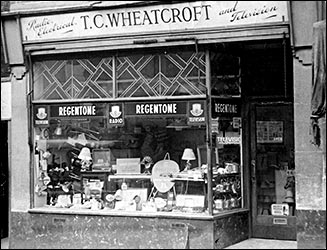 |
|
Wheatcroft's first "showroom"
|
|
My dad had two shops after a few years. He had the original shop, which was next to Cook’s, and then we had a showroom, which was the other side of the road but not opposite. Every Saturday night I can remember that Vic Fleeman, the chemist on the corner of Church Street, used to come down. I can see him now in his long overalls, lick his pencil ready to take down the football results, because dad was the only one that had a television round there with the football results. My mum used to help occasionally and I also used to help after school and I’ve still got till rolls upstairs with my writing on, from about age five.
Dad’s first shop was called Church Street 'sub-station' because all the police used it in between their beats and on their beats for coffee breaks, and things like that. They used dad’s car as a panda car because they only had push bikes in those days so they used dad’s when they wanted to chase somebody around. I can remember on one occasion somebody came into the main shop and said. ‘Theo, you got a new assistant?’ and he said. ‘No.’ He said. ‘Well somebody has just gone into your showroom.' Both shops were open and it was two way traffic in those days; after this we had a cable diagonally across the road, so if somebody went in the showroom a bell used to ring in the other shop. This “chappie” had gone in there and tried a few radios and suddenly walked out with one.
The "Showroom" (photograph right) was diagonally up the road opposite the first main shop which was next to Cook's as it was then, (one below), and one door up was a two storey flat which dad later occupied for storage and back shop extension. The next door up from the flat was Fairey Brothers, the ironmongers (which later became part of what "Crisps" occupied to start with).
|
|
So dad rang the constabulary, it was Jim Kirk or Tom Lewis, and said what had happened, they came running down the road and off they went in the car, down the High Street and eventually they found this radio wrapped up in newspaper in Cox’s cafe. It had been handed in and put under the counter, nothing to do with Cox’s, of course. The man had said, ‘Oh, someone will come and collect it later, can I leave it here?' So the plain clothes police waited until it was picked up and it was an American GI out at Chelveston. When they searched his flat down at Miss Clipston’s, on the corner of Alfred Street, they found a seven inch flick knife under his bed. So they really "took him to town" and dad had to go to the tribunal. That’s the only time that I can remember that anything was stolen of any consequence.
Dad used to leave me on my own when I was seven because obviously he had to go out to pick up equipment for repair, and do electrical work in people's houses. He used to leave me on my own with two shops either side of the road, which was no problem in those days. I’d have a shop full of people and the telephone would ring, so I’d say. ‘Excuse me a minute, can you talk amongst yourselves.’ People had time in those days and I’d answer the phone and then the bell would ring across the road so I’d say. ‘Could you hold the line a minute, please.’ Run across the road, open the door and somebody would say. ‘Oh, I’m interested in a television set.’ So I’d switch all the television sets on and say. ‘I’ll be back in a minute.’ Run back, finish answering the phone and say. ‘Back, in a minute.’ and whip over the road again. So you learn fast and I suppose I was brought up as a boy and that’s why I found it difficult going to boarding school because I was used to this freedom. We had a 1000 watt lamp in the shop porch and dad used to do car electrical repairs with his head under the bonnet in the street. People would say. ‘Oh, Theo, have you got so and so?’ ‘Yes, go in I’ll be there in a minute,’ no problem, times have changed.
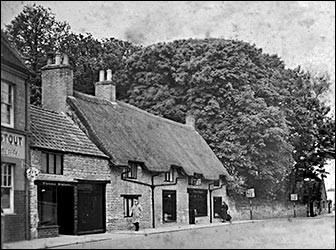 |
|
Florence Simpson's
|
|
When I was little I used to spend a lot of time with my friend Julian. Our parents were friends, his aunt was Florence Simpson, her sister was his mother and they had Florence Simpson’s, the thatched roof gown shop, along High Street South. Sometimes I used to go there and play while the parents were talking. We’d sneak into the gown shop and get a fur coat off the rack, put it fur down, because that’s nice and slippery; I used to sit on it, while Julian would run, dragging me around the shop on it. Another thing we used to do; upstairs in the lounge he had quite a few percussion instruments, I used to hang out the window and wait until some people came along. When they used to get just below the window I’d give the signal and he’d start off on the drums. Of course they’d think there was a band coming and look in all directions, and that was the sort of wicked, innocent things we used to get up to. |
Mum, when I was a little bit older, used to spend more time in the shop. I can remember when she was very pregnant with my sister, Chérie, who’s ten years younger than me, mum still used to have to get up to reach the lamps - all kept on very high shelves. I’ve got a big rod that comes out of the counter, same counter that used to be across the road, and because the shop was small you used to have to stand up on that rod and get up on the counter and the counter’s almost up to my chest, and then get down again.
I remember the era when the voltage changed. It wasn’t 240 in those days, it was 210. As they changed over you had to ask the person which street it was they lived in to tell them what voltage they needed. One funny thing happened, dad had a nice boy working for him called Pete who came straight from school. He hadn’t been working long and was serving a customer, demonstrating an electrical fire on the counter and not having a great deal of experience, had left it on. Well, along the front of the counter dad used to have service aids, like car paint aerosols and heat and car paint aerosols don’t mix. He was called to the phone or something and left this fire on; suddenly there was this explosion and silver paint exploded straight into this chap’s Crombie coat, and behind him was a man in an Aran sweater! It’s a coincidence; this happened fifty years ago probably and this week this gentleman walked in this shop and we got into conversation and this incident actually came up, and he suddenly said, ‘That was me!’ He recalls the Crombie coat and dad having to get it cleaned and there’s still smatterings of that paint on fittings from the old shop, here to this day. That was quite a nasty moment, but everybody laughed about it, thank goodness.
|
We used to have a laugh in those days, much more than we do now. Loads of reps used to come whereas now you don’t see any reps at all. We used to spend loads of time talking and laughing. People had more time, they enjoyed coming in and being served. It’s been said that dad would weave a tale and people would go out two hours later and forget what they came in for.
We lost dad unfortunately in the year ’83, a stroke, and I eventually left Boots, where I’d been for twenty three years, and helped my mum carry on the business. Because, although we’d lost him, I didn’t want his business to die, so, eventually, I swapped from cosmetics to cable. Then mum took me in as a partner and we worked together and she worked here full time until she was over ninety. I used to call her the gaffer.
|
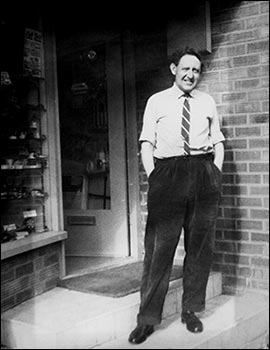 |
|
Theo Wheatcroft in about 1970
|
|
| Mum had got a fantastic sense of humour, we used to giggle like mad. She did all the paperwork here until she was 90, and even then she used to take paperwork home. She used to sit in the little office here with her cigar and calculator. She recalled one day that I was off and she was here on her own. These two people came near the door and she heard them say. ‘Oh, it’s just the old dear, it’s just the old dear there.’ So she whipped round the counter, 'sharpish' like, as they say round here and stuck her head out the door. She said. ‘I might be the old dear but I’ve got good ears, what is it I can help you with?’ So they came in and she served them very efficiently of course. |
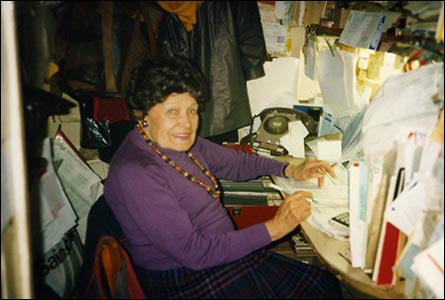 |
|
Mercedes Wheatcroft around 1992
|
|
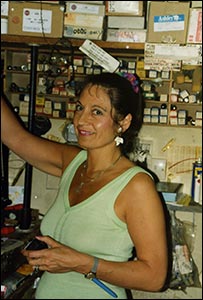 |
|
Veronica Wheatcroft
|
|
| She used to get annoyed when youngsters particularly used to grab the calculator right over the other side of the counter and start adding things up. We added everything up on paper, on the counter, so we could see it, they could see it and probably two or three days later it was still there so you could always check everything. She could add up quicker in her head than they could on the calculator. |
My father was one of the founder members of the Conservative Club here and my mother was asked to join a skittle team around Bedfordshire because mum and dad used to do quite a bit of business out in the sticks, as we called it.
| When she got into her 80s, mother, when she was I think 84, we lived in a bungalow right in the corner of Robinson Road. On the opposite side they started doing some building and particularly on Sundays there used to be a lady sitting in a little hut, for showing people round the houses to be. This young lady, I can’t remember her name, used to go round to mum on Sundays for a cup of tea or possibly something a little stronger. Sometime after this she said. ‘Oh by the way Mrs. Wheatcroft, the builders have asked me to ask you if you could think of some names up for the new road.’ She said. ‘Oh, right, well, ok.’ So she thought about all sorts of little things like, you know, Sweet Briar Crescent, nice little names like this and she told this young lady. Weeks passed and didn’t hear anything and didn’t think about it. Then one day, in 1992 I think, this young lady said, ‘Oh, by the way, Mrs. Wheatcroft, they didn’t use any of the names you chose.’ Mum said. ‘Oh, that’s alright, I didn’t think they would.’ She said. ‘They’re going to name it after you instead.’ She couldn’t believe it and the first thing I heard of it, I was motoring to work that morning and it came on Radio Northampton. It was, spritely 84 year old Mrs. Wheatcroft of Robinson Road, Rushden has had her name used for the new road, Wheatcroft Gardens. We’ve got a photograph of her and she was very happy that day, I miss them both. |
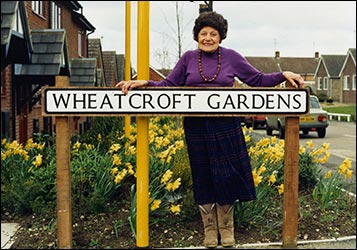 |
|
Wheatcroft Gardens
|
|
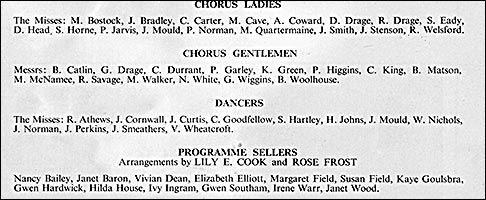 |
|
'Desert Song' programme
|
|
Around 1961/62, I went to Mr. Palmer, down the High Street who had a florist shop I think. He was one of the leading lights of the local Operatic and the R.A.T.S. (Rushden Amateur Theatrical Society) and I was a member of the very first R.A.T.S. production. As a child - I used to go to the Kilburn School of Dancing (based in Wellingborough) and I loved dancing, I still do, that is my first love really. I was in a few of the R.A.T.S. productions and also the Operatic. Then I was interviewed for the next production and in between times I was transferred by Boots to work in Leicester, at one of the big branches. So I didn’t actually go into the next performance. |
When I was 13 I had three ambitions, I can remember writing an essay about this. One was to have a Mercedes car, my mum’s name was Mercedes, of course, one to do judo, and one to go to India. Thirty seven years later I got my Mercedes car, a very old second hand one I add, but yes, that was that one accomplished. Then I took up Karate. My first husband was also a pharmacist and worked for Boots, the same as I did, and we went up to Sunderland to live because he had a transfer and I started Karate up there. It’s the nearest you can get to Judo, because I’d never heard of Karate when I was 13, and to this day I still do it and I’m 64. As for the going to India that’s yet to come, it’s still an ambition.
This business also is half sentimental to me. My dad’s still here, his jacket’s still upstairs and I can hear him; I can feel his presence sometimes. When I was first here I had to learn; I remembered a lot of things from when I was little and I knew how dad did business. I knew how he cared about people and hated people buying new when the old could be repaired. Little ladies used to come in and say. ‘Mr. Wheatcroft, how much is a new iron?’ And he’d say. ‘What’s the matter with your old one then, bring it in.’ If everybody had carried on doing that we probably wouldn’t be in the mess we are now with all the landfill sites filling up.
He always taught me never to borrow anything and never lend anything and I’ve always kept that up. When he died suddenly he didn’t owe a penny to a soul. There was the money in the till from that morning, which I used to carry on, and a few goods that he’d had that month that weren’t due to be paid for until the end of the next month, which is normal. Apart from that there wasn’t anything at all unpaid for, it was one of his principles.
| Going back to Billy Abbott’s along Bedford Road, and Old Billy Abbott, not his son with the same name, and I’m talking about when I was about five, which would be 1949. Billy Abbott, he was quite funny, he used to laugh his head off and his top set used to stay down with his bottom set. There was quite a few garages down there and one section used to be old stables and I think it happened more than once actually. Dad parked his car in the garage and was about to walk up the road home when he heard something and turned round. The garages in the middle of the area, I suppose they’d be less than the distance of the width of a normal road, he turned round and there was a fellow standing there in complete long frock coat. Frock coat is perhaps the wrong word but it was buttoned from the top to the bottom and he immediately thought it was obviously Billy Abbott. He thought, what the hell’s he dressed like that for and he said. ‘Billy, are you alright?’ This man walked towards him and he got very close then disappeared. Read into it what you will but old Billy Abbott’s father ran that place before him and of course had old funeral horse and carriages and used to wear this sort of gear. He only had to put two and two together and it really made his hair stand on end. I think it happened more than once and I hasten to add my father had not been drinking so it’s quite weird really. |
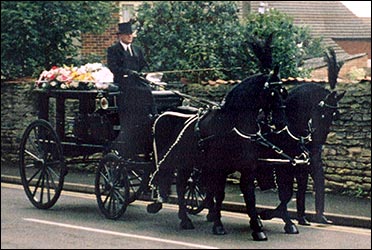 |
|
Abbott's Funeral Carriage
|
|
I remember down the High Street there used to be the Penny Bazaar, I think it was called. A lady used to work in there and I used to think she was so tall, I’d never seen anybody so tall in all my life when I was a little girl. It wasn’t until quite some years later I found out that the floor behind the counter was raised about a foot. Down Church Street, going down on the left hand side, I think it was Mrs. Goosey. She had one of these lovely old-fashioned shops that had lots of underwear and things, all hanging on display from high up. Long sleeved vests and goodness knows what, you know. I remember I bought my first bra there and it had got that many straps that tucked in there and round there and I think it was pink satin, a terrible thing, and I was about twelve, I think. I can remember the jumper I wore it under and it was one knitted by my mum in cherry pink, cherry red. I remember standing on the step at Dad's shop, and remembering I’d got it on and thought, self-conciously, oh gosh I hope nobody notices.
There was Cutmores, the cycle shop and Buntings, I think it was the hairdressers. Next to our old shop was a flat, Ron Coles had that with his wife and he worked for Robinson’s garage in High Street South. Then there was Fairey Bros. the ironmongers and then there was Vic Fleeman, on the corner. Knights, round the corner, Knights the tobacconists and before you got to that it was Taylor’s, the furniture people, whose children I went to school with at Miss Fyfield’s. They had three children, Roma, Rita and Richard and, sadly, I think Richard died prematurely, he got killed on the A6.
Richard, a nice boy, I can remember him. He was younger than Roma and Rita and I believe and it was after I’d left Rushden and was working for Boots in Leicester, and I heard that he was walking along the A6 (there used to be a disco night club along Bedford Road at Souldrop turn) and I believe he was with a blind boy. He was walking along there and they were swept up by a car and Richard was killed. It was very sad.
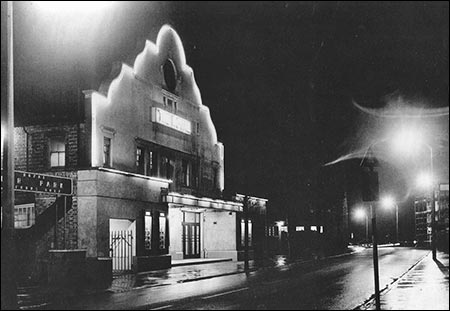 |
|
The Theatre Cinema
|
|
There was a cinema down the High Street which my dad never allowed me to go to but we went to the Theatre, down the bottom. When I was about 13 or 14, I had a girlfriend called Pam and we wanted to go and see a film. Dad was so worried about us that he rang up the manager to say that we were coming and to keep an eye on us and insisted that we went upstairs instead of downstairs. It didn’t work out very well because my friend Pam was short sighted and she hadn’t got any glasses. We went to see The Hound of the Baskervilles, quite scary. At one point I referred to something on the screen and she said, ‘I don’t know, I haven’t got my glasses, I can’t see a thing.’ So dad wasn’t very popular really that night and of course he met us out and took us home, that was the way in those days. |
Rushden Feast, I remember going, I’ve only been about twice I think. When I was quite young dad took us and Julian’s father took Julian. We must have been small because I can remember sitting on my dad’s shoulders. Two things I can remember, I don’t know whether I should record this or not, he took us into this tent where the young ladies' tassels they had fixed to them, were swinging merrily, and obviously the fathers were quite enjoying it. Then we had candyflosses and they were bright pink and I can remember being terribly sick. I was actually on the shoulders of Julian’s father, Frank, at the time and I think I was sick on his head. I could have only been about 2 or something and that’s about all I remember about Rushden Feast I’m afraid.
Dad's old customers and friends still come to visit, oh, yes. Obviously the older ones are getting less and less unfortunately. But I still like to carry on in dad’s footsteps in looking after, particularly the elderly and the frail people. Lots of ladies that find themselves widowed, where their husbands used to do all the manual, all the electrical work and things like that they really are completely at sea. So I help to try and explain things to them.
My mother's name was Elizabeth Barbara Mercedes but she was called, mainly, Mercedes, shortened to Merce. Her name came from when her mother, presumably while pregnant with my mum, and was reading the Count of Monte Cristo book and there’s a Mercedes in it and that’s where the name came from. Chérie Elizabeth, my sister is a fantastic artist. I can remember when she was first born my mum and dad were sitting having a glass of sherry. Mum wanted to call her Cheryl, or something like that and dad wasn’t too keen. We were drinking sherry, so he said. ‘Ah, ma Chérie, my darling.’ So that’s how her name came about, and Elizabeth was one of my mum's mother's names. Mine is Veronica, mum wanted Valerie, but dad didn’t like that so I became Veronica and my second name is Rose after my dad’s mother and I’m now still a Wheatcroft, Wheatcroft-McGain, because I like to keep my name because we haven’t got any more males in the family. And that’s it.
|
